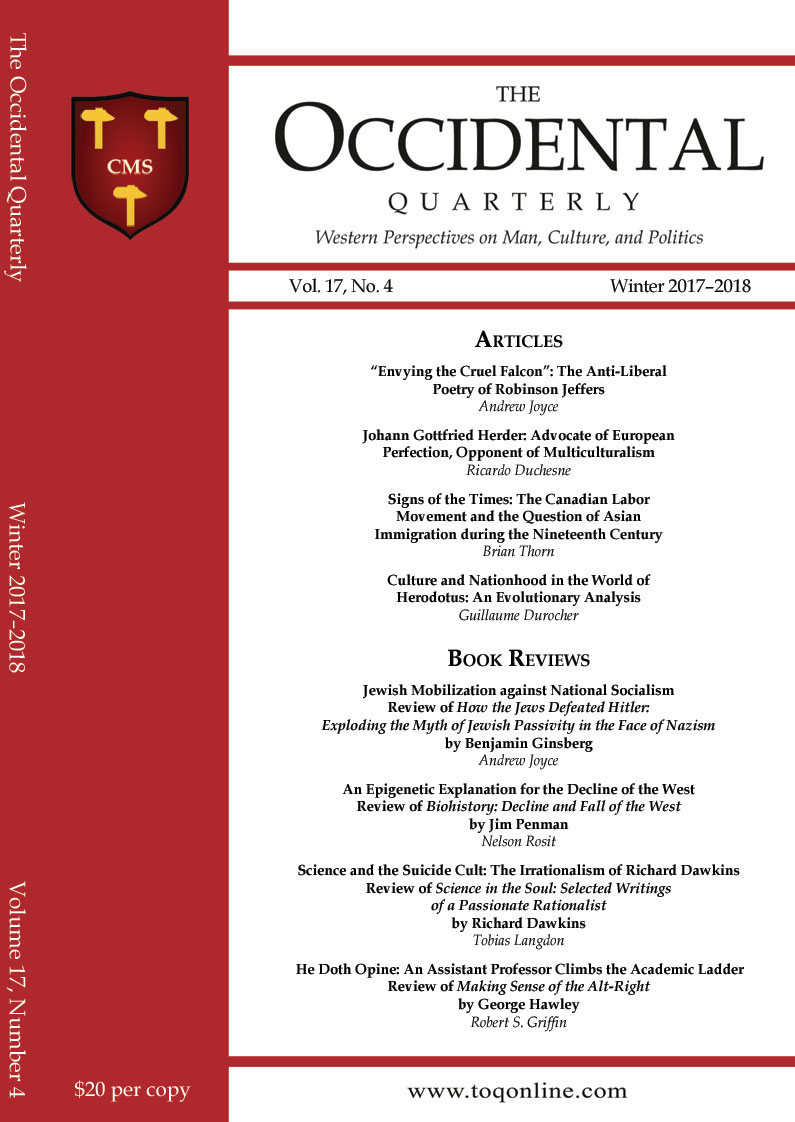Second Reply to Nathan Cofnas
I have posted a second reply to Nathan Cofnas, this one on his comments to my first reply. It is long and tedious but I thought I would post the Introduction and an excerpt from the exchange on immigration.
Introduction
Nathan Cofnas has responded to my reply to his review of The Culture of Critique. Prior to getting into the details of his rejoinder, there are several general points that should be kept in mind.
- CofC stands or falls depending on whether I have adequately described certain specific intellectual and political movements as Jewish. In doing so, I focused on movements that were or are influential and provide evidence of their influence. In describing these movements, I focus on the main figures, discuss their Jewish identities and their concern with specific Jewish issues, such as combatting anti-Semitism. I discuss the dynamics of these movements—the authoritarian atmosphere, the guru phenomenon, ethnic networking, and non-Jews who participate in the movement. I am not attempting to discuss all well-known Jewish intellectuals if they are not part of these movements. Thus, I never claim that Marx was part of a specifically Jewish intellectual/political movement, since he died long before the rise of the Jewish left in the twentieth century which is the focus of CofC. Noam Chomsky is a well-known Jewish intellectual, but he doesn’t fit into any of the movements I discuss, and I have never investigated the nature of his Jewish identity (or lack of it) or how he sees Jewish interests. The same could be said for someone like Paul Gottfried who is linked to paleoconservatism. Paleoconservatism is not a Jewish intellectual movement, and indeed neoconservatism, which I argue is a Jewish movement, played a decisive role in the eclipse of paleoconservatism (see “Neoconservatism as a Jewish Movement”). Or one could point to a Jewish supporter of the populist positions of President Trump, but the existence of such a person does not make populism a Jewish movement or erase the effective opposition of the New York Intellectuals to American populism in prior decades as discussed in Chapters 5 and 6 of CofC.
- Individual influential Jews or a separate influential Jewish intellectual movement may be critical of a specific Jewish intellectual movement that I discuss. The split beginning in the 1930s between the Stalinist left, which is the topic of Chapter 3, and the Trotskyist left which is a topic of Chapter 6 and “Neoconservatism as a Jewish Movement,” comes to mind. It is possible that opposition to the Israel Lobby may also be reasonably analyzed as a Jewish movement. I have not attempted this, although I have noted in several places that criticism of Israel is increasing among Jews and non-Jews. But in order to establish that critics of Israel constitute a Jewish movement, one would have to pursue the program presented in CofC: discuss whether participants have a Jewish identity and whether they see their activities as furthering Jewish interests as well as explore the dynamics of these movements—whether there is any evidence for an authoritarian atmosphere, the guru phenomenon, ethnic networking, and the status of non-Jews who participate in the movement.
This project would thus go well beyond the “default hypothesis” of Jewish IQ as explaining Jewish involvement in intellectual movements. Such situations may be analogized to arguments between different factions in the Knesset—both dominated by Jews but with different perceptions of Jewish interests.
- I am therefore not attempting to develop a general theory of Jewish viewpoint diversity. I am studying certain specific intellectual and political movements that I attempt to establish as influential. I am not trying to develop a theory of why each Jew or most Jews believe what they do—a much more ambitious project. Thus, for example, I have no interest in describing or explaining the diversity of Jewish attitudes on affirmative action—an interesting question, but not relevant to the thesis of CofC which is that certain specific Jewish movements have the features I describe and that they have been influential. Nevertheless, as discussed below, at particular times and places, there is often substantial consensus within the Jewish community on particular issues, e.g., immigration and refugee policy and church-state relations.
- My writing in CofC is restricted to the movements discussed therein—movements that I have argued have been influential in the twentieth century and whose influence often extends into the present. In addition to these movements, it may well be the case that I have left out individual influential Jews, such as Steven Pinker, whose Jewish identity and sense of pursuing Jewish interests would bear investigation and may result in a broader perspective on Jewish influence. Pinker’s recent book, Enlightenment Now,[1] is reminiscent of the hostility toward American populism that characterized the New York Intellectuals whose Jewish identities and sense of Jewish interests were discussed in CofC. However, whatever the results of such an investigation, they would be subsumed into the general topic of Jewish viewpoint diversity.
[1] See Ricardo Duchesne, “Steve Pinker’s Anti-Enlightenment Attack on White Identitarians,” Occidental Quarterly 18, no. 2 (Summer 2018): 49–68; in press. Read more

 The horseshoe crab is a
The horseshoe crab is a 




